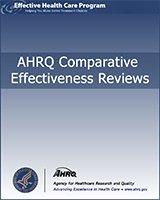NCBI Bookshelf. A service of the National Library of Medicine, National Institutes of Health.
Ip S, Terasawa T, Balk EM, et al. Comparative Effectiveness of Radiofrequency Catheter Ablation for Atrial Fibrillation [Internet]. Rockville (MD): Agency for Healthcare Research and Quality (US); 2009 Jul. (Comparative Effectiveness Reviews, No. 15.)
This publication is provided for historical reference only and the information may be out of date.

Comparative Effectiveness of Radiofrequency Catheter Ablation for Atrial Fibrillation [Internet].
Show detailsThe Agency for Healthcare Research and Quality (AHRQ) conducts the Effective Health Care Program as part of its mission to organize knowledge and make it available to inform decisions about health care. As part of the Medicare Prescription Drug, Improvement, and Modernization Act of 2003, Congress directed AHRQ to conduct and support research on the comparative outcomes, clinical effectiveness, and appropriateness of pharmaceuticals, devices, and health care services to meet the needs of Medicare, Medicaid, and the State Children's Health Insurance Program (SCHIP).
AHRQ has an established network of Evidence-based Practice Centers (EPCs) that produce Evidence Reports/Technology Assessments to assist public- and private-sector organizations in their efforts to improve the quality of health care. The EPCs now lend their expertise to the Effective Health Care Program by conducting Comparative Effectiveness Reviews of medications, devices, and other relevant interventions, including strategies for how these items and services can best be organized, managed, and delivered.
Systematic reviews are the building blocks underlying evidence-based practice; they focus attention on the strength and limits of evidence from research studies about the effectiveness and safety of a clinical intervention. In the context of developing recommendations for practice, systematic reviews are useful because they define the strengths and limits of the evidence, clarifying whether assertions about the value of the intervention are based on strong evidence from clinical studies. For more information about systematic reviews, see http://effectivehealthcare.ahrq.gov/reference/purpose.cfm.
AHRQ expects that Comparative Effectiveness Reviews will be helpful to health plans, providers, purchasers, government programs, and the health care system as a whole. In addition, AHRQ is committed to presenting information in different formats so that consumers who make decisions about their own and their family's health can benefit from the evidence.
Transparency and stakeholder input are essential to the Effective Health Care Program. Please visit the Web site (www.effectivehealthcare.ahrq.gov) to see draft research questions and reports or to join an e-mail list to learn about new program products and opportunities for input. Comparative Effectiveness Reviews will be updated regularly.
- Carolyn M. Clancy, M.D.
- Director
- Agency for Healthcare Research and Quality
- Jean Slutsky, P.A., M.S.P.H.
- Director, Center for Outcomes and Evidence
- Agency for Healthcare Research and Quality
- Preface - Comparative Effectiveness of Radiofrequency Catheter Ablation for Atri...Preface - Comparative Effectiveness of Radiofrequency Catheter Ablation for Atrial Fibrillation
Your browsing activity is empty.
Activity recording is turned off.
See more...